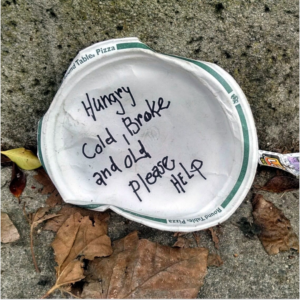17 year-old Siri Atluri in conversation with a houseless individual

In June 2023, according to the Guardian, 171,000 people were homeless in California.
January 12, 2024
Houseless in California - Experiencing a Human Rights Crisis
It’s 8:30 am on Wednesday, February 8. On the street outside of Bella Cruz Court, cars stream by. On a sidewalk parallel to the neighborhood lies a scatter of tents and mounds of clothing, muted in color. Next to one of these mounds is a bright purple floral patterned blanket, made from fleece.
In the blanket, shielding himself from the crisp Sacramento air, is the outline of a man easy to miss without a second glance. He is completely covered by the blanket, his knees crunched to his body to keep warm on a cold Californian morning. It’s 7°C outside, but he sleeps on the sidewalk.
That man’s name is William Reddick. He is 37 years old and has been houseless since 2017.
Reddick meets me at a Burger King. After asking me about my budget in line, he orders a burger, fries, and a drink before he thanks me for our meal. As we take a seat, he stretches out before we start talking.
Reddick is a tall black man who wears his hair in locs; he says his friends call him Unicorn, because of his longest lock that hits the halfway point of his neck. He’s wearing a green and white plaid jacket, blue-washed jeans, vibrant color patterned shoes, a ring, and a turquoise necklace.
It’s important to note that Reddick doesn’t consider himself homeless. Instead, he sees himself as a houseless individual. “I feel like if you’re homeless, that’s saying like, you’re not from this Earth, you’re from some other planet. For me, the Earth is my home.”
Our conversation starts with Reddick telling me the story of visiting Neverland Ranch when he was five years old.
He talks fast and quietly, so I lean in to hear him. He doesn’t make much eye contact. His eyes wander around the diner, and he looks out the window behind me as cars rush by on outside roads.
“I got to meet Michael Jackson and go to his mansion. It was crazy, it was fun. I had a fun time. It was like an amusement park. He had this room, it was like a satellite plasma room—he does a lot of meditation in the room. It was like Bzzz. And then the walls changed. It was crazy—it was like a sound and light show,” Reddick explains.
He continues to tell me some other core childhood experiences that he remembers fondly. Reddrick says he also won a tap dancing contest when he was just five, and when he was in sixth grade, he visited Yosemite Park. (“My other friends went to Sly Park, but I don’t know where Sly Park is,” he adds). Reddick says he enjoyed the park’s natural aspects.
Talking with him, he expresses how he is a very spiritual person following a mixed religion. “I created my own religion basically; Thizzlamic. Thizz is a record company my uncle Mac Dre started,” he explains. Mac Dre was a famous rapper from Vallejo, California, who founded the independent record company Thizz Entertainment.
He himself loves to rap, and is very much inspired by the hip-hop greats Mac, Dre, and Tupac. He’s also inspired by his uncle Tory, who sang for him when he was little. According to Reddick, his uncle had “the best voice ever.”
Reddick described the day Dre was shot, and by the way he talked about the event, slow and steady, it’s clear that Dre’s death has an emotional weight on him. To Reddick, Mac Dre is like an uncle, without actually being one, and also a catalyst for his own desire to pursue music.
Graduating high school in 2003, Reddick went to UC Davis and Alabama A&M for college, which he says was the “only time I ever had straight A’s.” Reddick tells me he has a degree in Communications and possesses an interesting perspective towards learning.
“I have mixed emotions about education, because a lot of things that I learned in school, you know; I don’t use on the streets,” Reddick says. “And a lot of the things that I do, that helped me survive, I learned in school. So it’s kind of difficult. My life becomes like a game of analyzing, you know, but you never wanna overthink. It’s a game of survival.”
Crucial skills like financial literacy, for example, aren’t always taught in-depth at U.S. high schools, but Reddick says he also needs to keep in mind certain other skills in his day-to-day life. General concepts one can develop in grade school—such as keeping memory, observing, and listening—are all vital for him on the streets. Without them, it’s easy to miss petty theft and other signs of danger.
“My Bluetooth speaker I was using, it was a Bose Bluetooth speaker I got from Walmart. And I kept hearing this little sound coming out of it, like a high-pitched frequency.” Reddick recalls that he turned away for only a second, and when he looked back his speaker had disappeared. A stranger had stolen it.
The same situation has occurred to him repeatedly with multiple prized possessions—such as his bike, and with his iPhone just two weeks before our conversation.Reddick hasn’t been able to call his family since his iPhone was stolen. He says he tried to buy a new cheap phone for $25 dollars, but he was told to go to welfare by the store’s employees.
“They didn’t let me buy one,” he explains. Reddick felt frustrated because he would use his phone to keep in touch with his grandma and his daughter. He remarked how he originally became houseless due to relationship issues with the mother of his child.
Another thing I learned is that Reddick faces many mental health issues. He tells me he is diagnosed with schizophrenia and manic depression and sometimes has “suicidal thoughts.”
He’s also battled with drug addiction. He states that he’s been clean of crystal meth for a month and is looking to get a job again to support his 12 year-old daughter.
“I’m constantly looking for motivation. I feel like I’m not motivated anymore, by what used to motivate me. Just being able to provide an honest living for my child. Just being able to take care of her, and raise her, with all the stuff that I’m doing and creating, which is my music.”
Reddick is supposed to be on medication for his mental health issues, but he feels hesitant to trust they’ll make him better. “I already have an addiction and I feel like pharmaceuticals are just another addiction you don’t wanna have, you know? That will lead you to more street pharmaceuticals.”
For Reddick, this hesitancy is also caused in part by his past experience with medications. “They were prescribed, and they gave me voices in my head that were not my voices.” Reddick explains that the voices he experiences from his schizophrenia heighten whenever he’s on drugs and are terrifying when they reappear. “It’s really scary. Because when they do come back, it’s not just a voice. It’s like male, and a silhouette, and everything.”
Reddick believes houselessness aggravates his mental health issues; solitude on the streets makes him sit with his thoughts for a little too long.
I can understand how Reddick’s mental illness affects him while in conversation. He tells me that he struggles to find a purpose, and he describes himself as a conspiracy theorist.
He talks about participating in a NASA internship, called Stargazer, through a Bluetooth speaker, (he says he started thinking that all the stars he saw were fake) and calls 5G towers fake satellite-projected trees. These details may represent delusions: according to Mayo Clinic, delusions and hallucinations represent common symptoms of schizophrenia in which a person develops false beliefs that are not based in reality.
Aside from just mental health, Reddick also revealed how he narrowly avoided deadly injury camping out during the onslaught of storms recently in the Sacramento area when he had his first good sleep in a while.
He didn’t want to get up and start his day, but a gut feeling told him to, and it turned out to be a good thing it did; right as he went to the bathroom, a big redwood tree came crashing down, right on the spot where he would have been sleeping just a few minutes beforehand.
He explains that it’s hard for him to get much quality sleep since he always feels on edge, wondering if someone will steal his belongings from him while he’s sleeping. Or, if another redwood might fall onto him at the crack of dawn.
Also spoken about was Reddicks experience with law enforcement, telling me he has been to jail “more than five times,” most recently for trespassing at a light rail station.
Revealing to me that “the first time I ever went to jail, ever, I was 18.” Reddick states that most of his arrests have been for trespassing; when he was arrested in college, for example, he and his friends were playing basketball at the gym California Family Fitness without a membership.
Learn more:
Of course, Reddick’s trouble with law enforcement didn’t end once he fell on hard times. Legislature and enforcement can routinely make homeless individuals feel dehumanized, with a recent study stating that law enforcement approaches “systematically limit homeless people’s access to services, housing, and jobs, while damaging their health, safety, and well-being.”
Reddick illustrated this to me with some of his first-hand examples: not only would police throw his and other homeless people’s belongings away, but they would force him and others to move, even if they were staying on vacant lots.
When it comes to advice, Reddick believes that the best thing houseless individuals can do to help each other is to stick together. “There’s strength in numbers. I feel like that’s why the police mess with homeless people so much, because there’s more of us than them.”
He also says it’s crucial for those experiencing homelessness to know their rights. “Read the law. Read the law in detail, and understand the law. And once you read the law and understand the law you’ll realize they can’t do the sh*t they’re doing to us. It’s against the law. And just ‘cause some cop has a badge or something like that doesn’t mean he can pull up and just throw your stuff away.”
For students or other individuals that want to help homeless individuals, Reddick says the best thing to do is to really spend some time with them. “You can just give a homeless person some money, and they can go get some drugs. That wouldn’t be helpful. They’re just gonna want more drugs. So, spend some time understanding.”
Reddick doesn’t just live on the streets. He’s also incredibly spiritual, has a passion for music and fashion, wants to work hard, and wants to financially support and be there for his daughter while she grows up, instead of becoming a sporadic visit.
Many times, those experiencing homelessness may also struggle with mental illness or addiction. Some have a hard time understanding the weight of these issues and homelessness without personal experience. However, it’s important, above all, to humanize homeless people, and to see them as more than just a statistic or a situation they can’t necessarily control.
At least, especially after our enlightening meal together—that’s what Reddick and I believe.



